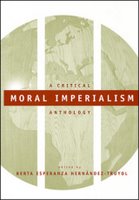Wednesday, April 12, 2006
One Superpower: The World We Face Today
With the fall of the Soviet Union, the United States became the only true superpower in the world, and many people in this country rejoiced, feeling that this would usher in a new age, based on the principles and morals that this country stands for: basic freedoms, justice, checks and balances, and rights that protects individuals and the society as a whole. Soon, we felt, these values and principles would spread to the four corners of the Earth, and a new age of enlightenment would be upon us.
Moral Imperialism
 This of course is far different from reality. As time rolled on, it became increasingly apparent that not all people have the same values or objectives in life. The rise of the Soviet Union was not the result of a dictator snowing millions of people, but rather a higher value being placed on all people having food and shelter than was placed on all people having civil liberties. When I was in the Soviet Union, the older people still remembered days with thousands of people in the streets in the dead of winter without a penny to their name. These people saw the rise of the Soviet Union as a savior; we treated it like a plague against human nature.
This of course is far different from reality. As time rolled on, it became increasingly apparent that not all people have the same values or objectives in life. The rise of the Soviet Union was not the result of a dictator snowing millions of people, but rather a higher value being placed on all people having food and shelter than was placed on all people having civil liberties. When I was in the Soviet Union, the older people still remembered days with thousands of people in the streets in the dead of winter without a penny to their name. These people saw the rise of the Soviet Union as a savior; we treated it like a plague against human nature.
Similarly, today we vilify societies that don’t share our values. True, as more people around the world are educated on freedoms and values of the West, more people long for similar values in their own society. Still, many people who explore democracy don’t prefer it. And the fact that we still continue to push our values on these societies, where the majority of the citizens don’t prefer democracy, this is moral imperialism, and threatens any possibility for stability within our society.
Many people want a society where they can be comfortable practicing their religious beliefs without the distractions of the modern Western world, while others might prefer communism, or any in a wide variety of other societies. And for those of you who believe these numbers don’t include the oppressed people in the society, there are millions of Muslim women who have seen what democracy offers and have chosen Islamic society as well.
Whereas democracy is supposed to be about allowing all people, communities, and societies make their own choices, democracy has become about allowing choices to be made as long as they are congruent with the morals of democracy. That is the point where our position as the sole superpower makes us our own worst enemy.
Effects Today
We start by mistrusting any society unwilling to accept those truths which we deem to be self evident. From there we move to demonization of the differences in the other society as compared with Western society, and finally to conversion to Western philosophies, attempting to push all societies to accept the basic tenants of our society. It is here that the one superpower society begins to fall apart: in the missionary-like fanaticism with which we push our value system on the rest of the world.
Because we insist other societies convert to our philosophy, an inverse relationship develops between the size of the superpower’s power base and the resistance the superpower feels. This is natural, right? Let’s say you are a person wants to live in a Muslim-based theocracy. As more Muslim-based democracies move to democracy, it becomes harder to find a place you like to live; there are fewer opportunities, less areas where you feel comfortable. It is only natural that you will grow increasingly frustrated. And with groups of people in this condition, more people will turn to resistance as the superpower grows.
Solutions
The way to avoid this problem is to accept countries as allies without asking them to move towards democracy. This is common practice when there are two superpowers, as both sides continually strive to increase their power base. But today, societies that don’t live up to our societal and moral standards cannot be accepted as is, and unfortunately all people do not share the same values as those portrayed in Western society. As such we become our own worst enemy. And I suspect that any superpower who stands alone in the world would wind up with similar difficulties.
The Exception
 It should be noted that the Roman Empire stands in direct contrast to some of my theories. The Roman Empire was stable, although they accomplished this stability by allowing all member nations to retain their original nature, even after conquering a country militarily. Taxes were paid to Rome, and respect on a wide variety of matters was always expected, but the member countries of the Roman Empire were generally allowed to retain their original flavor.
It should be noted that the Roman Empire stands in direct contrast to some of my theories. The Roman Empire was stable, although they accomplished this stability by allowing all member nations to retain their original nature, even after conquering a country militarily. Taxes were paid to Rome, and respect on a wide variety of matters was always expected, but the member countries of the Roman Empire were generally allowed to retain their original flavor.
There were only small exceptions to this policy, on those exceptions led to revolts. For example, the Jewish community was not allowed to practice Judaism openly. And the result? The result was one of the few revolts against the Roman Empire, The Great Jewish Revolt lasting 7 years. So, as long as the Roman Empire allowed societies to retain their culture and beliefs, they were able to remain stable. And as long as they only affected a few smaller societies, they retained the overall security of the Empire.
So while it’s true that the Roman Empire does create some questions to my theory, I believe it reinforces my theory, showing that it is the moral imperialism that will always be the downfall of the solitary superpower.
Additionally
There are two additional points to cover in this post. First, Sonia-Belle made an interesting comment when I posted my theory originally, indicating that the singular superpower should be more stable, and that the current superpower does not create stability because the US does not step up and claim the position of superpower. This is a fascinating point, so take a look:
So why don't we have a stable Pax Americana since 1991? Because, contrary to what you state, US actually refuses to assume its role of the world's sole superpower. Nobody is really afraid of it. Nobody would have dared to challenge the Roman Empire in its heyday the way Chavez, Iran or China are challenging the US all the time.
US could have easily established its supremacy by selectively nuking a few trouble spots (say Pyonyang, Teheran and Havana). That would terrorize the rest (China, Venezuela, etc.) into complete submission. We would have Pax Americana...
Problem is, a United States capable of doing that probably wouldn't be a liberal and democratic state it is now (no matter what some morons say). We would have peace, but that peace would be no different than a Pax Germanica that would have followed a Nazi victory or a Pax Sovietica....
I would rather have wars that those Paxes...
Brilliant points, Sonia. I believe that the US does claim their position, but certainly this is food for thought. I encourage other opinions on it, because it has me thinking.
Finally, it should be noted that, in the days of the Roman Empire, during this period of stability, there was tremendous corruption within the power structure of the society. The people in power became increasingly willing to do whatever it took to retain their power, while the divide between haves and have nots grew exponentially. Certainly, this corruption was a factor in the demise of the Roman Empire, and perhaps we will see the same in our society.
technorati tags: Superpower, Imperialism, Democracy, Middle East, Iran, United States, Soviet Union, Europe, Roman Empire, Great Jewish Revolt
Posted by Scottage at 4:59 AM /
| |



 This of course is far different from reality. As time rolled on, it became increasingly apparent that not all people have the same values or objectives in life. The rise of the Soviet Union was not the result of a dictator snowing millions of people, but rather a higher value being placed on all people having food and shelter than was placed on all people having civil liberties. When I was in the Soviet Union, the older people still remembered days with thousands of people in the streets in the dead of winter without a penny to their name. These people saw the rise of the Soviet Union as a savior; we treated it like a plague against human nature.
This of course is far different from reality. As time rolled on, it became increasingly apparent that not all people have the same values or objectives in life. The rise of the Soviet Union was not the result of a dictator snowing millions of people, but rather a higher value being placed on all people having food and shelter than was placed on all people having civil liberties. When I was in the Soviet Union, the older people still remembered days with thousands of people in the streets in the dead of winter without a penny to their name. These people saw the rise of the Soviet Union as a savior; we treated it like a plague against human nature. It should be noted that the Roman Empire stands in direct contrast to some of my theories. The Roman Empire was stable, although they accomplished this stability by allowing all member nations to retain their original nature, even after conquering a country militarily. Taxes were paid to Rome, and respect on a wide variety of matters was always expected, but the member countries of the Roman Empire were generally allowed to retain their original flavor.
It should be noted that the Roman Empire stands in direct contrast to some of my theories. The Roman Empire was stable, although they accomplished this stability by allowing all member nations to retain their original nature, even after conquering a country militarily. Taxes were paid to Rome, and respect on a wide variety of matters was always expected, but the member countries of the Roman Empire were generally allowed to retain their original flavor.